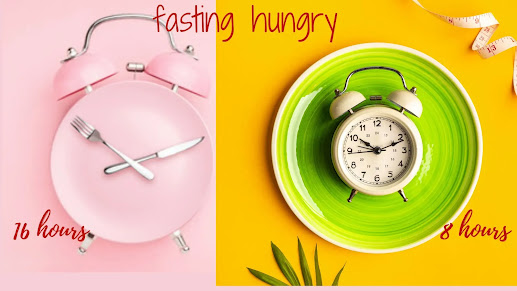See Also: Plant Protein: One Better Than The Other Nutritionist Explains
Suppose you are unfamiliar with the fundamentals of and how intermittent fasting functions. If so, we advise reading our essay on intermittent fasting: How it functions and what to anticipate before moving forward?
It's simple to boost your health and well-being by practicing intermittent fasting. There are numerous approaches, but they all struggle with the same issue: how to keep from starving while fasting
 |
| how-to-stop-feeling-hungry-while-intermittent-fasting:freepik |
Hunger And Intermittent Fasting
Hunger is a common issue that has a variety of potential causes. It can be brought on by a lack of energy or a lack of nourishment at different times. Hunger is a common issue that has a variety of potential causes. It can be brought on by a lack of energy or a lack of nourishment at different times.. Hunger can be a very dangerous condition, and it can lead to a lot of problems if not dealt with.One of the best ways to deal with hunger is to intermittent fast. Intermittent fasting is a type of diet where you only eat between periods of fasting. This means that you eat normally for about 12 hours, and then you fast for about 16 hours. This type of diet has been shown to be very effective in reducing hunger and helping you to lose weight.
One of the biggest benefits of intermittent fasting is that it can help you to lose weight without having to exercise. This is because intermittent fasting.
- Ghrelin is a hormone that is produced in the stomach when the stomach is empty. Ghrelin signals the body to eat.
- Pavlov demonstrated that classical conditioning can occur in humans by ringing a bell and then giving food to dogs. The dogs would eventually associate the bell with getting food, even if they had not been given food before.
“Food is the most important thing in your life, but you are not your food.” -Anonymous
- Your brain and your gut are inextricably linked. In fact, your gut is estimated to contain about 100 billion bacteria, which are responsible for your metabolism and your overall health.
What you eat impacts your brain in a number of ways. For example, eating processed foods has been shown to increase the risk of developing anxiety and depression. Furthermore, a poor diet can lead to mood swings, weight gain, and even chronic diseases such as cancer.
How can you be sure that your meal is nourishing rather than depleting your brain? Here are a few tips:
1. Eat a balanced and healthy diet.
2. Avoid processed foods.
3. Eat plenty
3. Eat plenty
Appetite and true hunger
True hunger is a feeling of intense physical need, and it's something that most of us experience only occasionally. Our stomachs are genuinely empty when we're truly hungry, and our bodies are signaling that we should eat.
But most of the time, our appetites are simply driven by things like boredom, stress, or loneliness. These things can be strong motivators, though.
manage hunger during
Hunger is a common problem during exercise. The secret to controlling hunger when exercising is to create a strategy and follow it.
It's crucial to have a prepared snack or meal available if you intend to workout for a long time. By doing so, you'll be able to maintain your energy levels and avoid getting ravenous.
It is a good idea to eat a snack or meal before you begin if you are simply exercising for a short time. By doing so, you'll be able to maintain your energy levels and avoid getting ravenous.
Additionally, it's crucial to stay hydrated while working out.
Stay hydrated
Stay hydrated by drinking plenty of water! It will assist you in maintaining your health as well as preventing thirst. Use reusable water bottles and sip on water throughout the day to ensure that you keep hydrated.
Stay hydrated by drinking plenty of water! It will assist you in maintaining your health as well as preventing thirst. Use reusable water bottles and sip on water throughout the day to ensure that you keep hydrated.
Consume high quality low-carbohydrate
When consuming low-carbohydrate foods, there are a few things to bear in mind. Make sure the foods you select are high-quality first and foremost. They are therefore loaded with vitamins, minerals, and nutrients. Making ensuring your dietary choices are minimal in carbohydrates is also crucial. As a result, they contain little sugar, starch, and grain.
Consuming low-carbohydrate foods in moderation is another crucial concept to bear in mind. This implies that you ought to consume them sparingly and seldom. If you over consume low carbohydrate foods, you may end up gaining weight and experiencing other health problems.
- Manage your stress level (Excessive stress)
- Get a good night sleep
- Drink tea or coffee
- Try to keep yourself busy
- Steer clear of food (side effects of intermittent fasting)
- Get a good night sleep ( partial sleep deprivation)
conclusion
Intertiment fasting, or intermittent fasting for short, is a type of fasting where you have a window of eating where you can have normal sized meals and snacks. This style of fasting is distinct from the traditional 16/8 fast, which involves fasting for 16 hours and eating for 8 hours.. Intertiment fasting is where you have a 12 hour eating window and a 12 hour fasting window. There are various methods for doing this, but the fundamental concept is to have a typical-sized meal and a little snack about noon and then consume a larger meal later on. meal and snack at night.


.webp)




.webp)

0 Comments